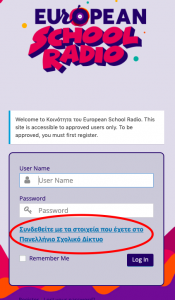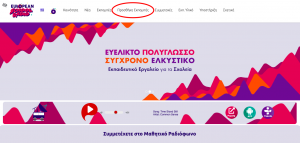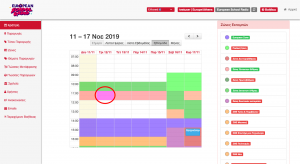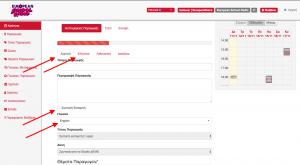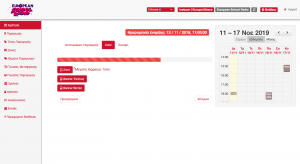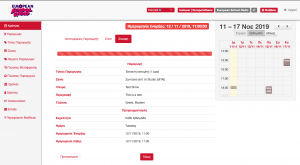The Scientific Society “Interdisciplinary, Intercultural Radio of the Educational Community” with the distinctive title “European School Radio, The First Student Radio” is the evolution and development of the European School Radio action and was created to facilitate at institutional level the implementation of programs and working with organizations in and out of education.
A brief historical overview of European School Radio
European School Radio is the evolution of Radio Ekali, which operated at Ekali High School (2008-2010). Since 2009, the Kilkis High School Camp has also started to participate in the School Innovation Network. In 2010-11 the Kilkis High School Campaign was fully responsible for coordinating and organizing renewed radio activities and sent an open invitation to schools, teachers and students to participate in their own productions.
It was renamed “European School Radio, the First Student Radio” in the spring of 2010, with the aim of expanding the action. The primary goal was to create an attractive web site to make it known to the educational community and to attract schools.
It was created as a School Activities Program, and in particular the Cultural Affairs Program, in which other schools collaborated. Its purpose was to present the ideas, creations, concerns of the student community and communicate them to the present day. It is a communication channel between the members of the school community both in Greece and abroad, while contributing to the school-community networking. Student Online Radio brings out the hidden side of the school and initiates its members into the participatory process. The involvement of students extends to all stages of radio development, as they participate in either technical support or broadcast production teams. Students created the logo and radio messages, updated the radio website, engaged in their own original radio and music production, and implemented from the beginning music broadcasts, speech broadcasts, and interviews with young people who were interested in speaking.
In 2012 the Kilkis High School Campaign co-ordinated a two-year program on the subject of student radio: “EUROPEAN SCHOOL RADIO: The Voice of Young Europeans”, within the framework of the European program COMENIUS 2012-1-GR1-COM06-10095-1 ( School Partnership). Eight (8) countries participated in the program and aimed to engage in the process of student radio production and students from other countries. The students of the Greek school made live and recorded broadcasts either from the radio studio created for this purpose in the school premises or from their home with the necessary radio production software. At the same time, television and radio spots were created by the educational and student community that promoted action in the Greek territory.
In the early years of its existence, an active network of schools, unique in Greece, was created and was constantly expanding. The first session included enthusiasm from fellow teachers and their students’ response to the call for radio production to a participatory radio program. The main argument of the creators of European School Radio was the social and pedagogical benefits that seemed to be gained by those involved in the process of radio production and the active role that students could play as radio producers, technicians, sound engineers, broadcasters, presenters, presenters, while teachers from the outset acted in support of the role of animator in student radio groups.
At the same time, the challenge was to create a complete radio program for streaming all day and every day (24/7) with the Jazler radio program automation software. After the software was delivered, the bands and music bands were organized on a weekly basis and thousands of songs were added to the database, depending on the required style of a school radio station. Content licensing was requested and obtained by the competent collective management body (AEPI) in order to establish the station for the music they broadcast, as well as the schools with the music content of their broadcasts.
For the school year 2013-14 the coordinating school of the action, as a program of school activities, was the Kalavryta Elementary School, with the support of the School Advisor of the 9th District of Achaia Primary Education. In the context of the democracy and equity promoted by the inspiring teachers of the First Student Radio, as well as the desire to renew, enrich and provide more radio opportunities this year it was proposed that the headquarters of the Radio be part of the Primary Education School. E. and DE Of Western Greece. The broadcasting was the responsibility of the above school, and the rights to use the audio material of the participating schools and pupils are granted. The schools that created the radio broadcasts were external partners within the framework of the Cultural Issues Program of the 12 / th Kalavryta Elementary School.
Since the end of 2013, Student Radio has been scientifically represented and guided by the Scientific Society “EDUCATIONAL COMMUNITY INTERMEDIATE, INTERCULTURAL RADIO” under the distinctive title “European School Radio”
(https://society.europeanschoolradio.eu/), which company is responsible for the actions of Student Radio and develops partnerships with education providers.
The Board of Directors is comprised of the the members of ESR Scientific Society.The ESR Society also extends the reach of members of community to the effective development and expansion of Student Radio, not only in Greece but also abroad. The founding members of the Scientific Society are the teachers Vafeiadis Anastasios, Yenitzes Anagnostis, Yagoulis Nikolaos, Hatzikamari Sianou Panagiota.
The European School Radio (ESR) Online Radio is now an online practice and learning online community (www.europeanschoolradio.eu ), through which primary and secondary schools throughout the country participate in a joint radio program on Student Radio, upon invitation at the start of the school year. Each year the web service is updated and improved, taking into account the educational needs.
Teachers together with students create original radio programs and often collaborate with corresponding radio teams from other schools. Schools from across the Greek educational community are invited to the online radio program. The radio program consists of a continuous stream of music (music) and is enriched with recorded or live productions of Primary and Secondary Schools on issues concerning pupils and integrated into the educational process. It now numbers about 400 schools each school year, with hundreds of teachers and thousands of students.
Teachers and students collaborate online in the online practice community & European School Radio. It is a field of communication both between teachers and pupils of schools of all levels in Greek territory, as well as in expatriate Hellenism and in Europe.
The nature of student radio as an online medium, a Web 2.0 (Web Radio) tool created by its users, conforms to the standards of Social Networks and uses all online tools to its advantage. This means that Radio is an online platform consisting of both streaming and community audio. The latter, gives the opportunity to present the producers and is a place of “meeting” and communication of participants. An important functionality of the platform is the organization and automation of schools’ participation from the time they apply for radio to the planning of their broadcasts. It also concerns the Radio archive (podcasts, broadcast texts, photos, and history in general), as well as the point of view and dissemination of producers in the student community. It provides the ability to interface with the popular Social Networks. Moreover, Radio sets as a primary objective the positive and secure use of the Internet, but especially of the Social Networks, and in a creative way (Web 2.0, cloud computing technologies) as already implemented on platforms of the Ministry of Education, Research and Religions.
In 2014, European School Radio was awarded the European Medea Awards with a special award as highly recommended for use in education.
As part of the online operation of the Student Radio service, a variety of radio dissemination actions are created by students in their schools, through their participation in nationwide radio competitions. The most notable example is the annual “Do It Hear” thematic competition, which allows students to participate by sending a radio message or original song and has a high impact across the educational community, counting up to 200 entries at a time .
At the same time, the celebration of the annual meeting of radio bands has been established in different parts of Greece every time. The purpose of the Pan-Hellenic Student Radio Festival is to get to know each other’s school radio teams, to collaborate and participate in marathons of live radio broadcasting, to share their experiences, to present their radio activity throughout the year, workshops and radio actions and communicate their experiences.
The program “Make Radio on European School Radio” implemented by the 2015-16 school year at ATEI Thessaloniki and the extension of the corresponding action in Attica with the “Radio Pages – Education” program also has an appeal in Primary and Secondary Schools. European School Radio Radio Library ‘implemented at the National Library of Greece at the Stavros Niarchos Foundation Cultural Center from the 2017-18 school year.
Corresponding opportunities for communication and collaboration are also given to teachers who enroll their school on Student Radio with educational activities, both live and distance, organized each year. Good radio practice in education can be presented and opportunities for the creation of joint inter-disciplinary works emphasized by the radio.
